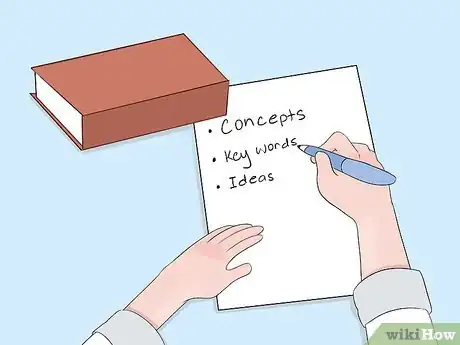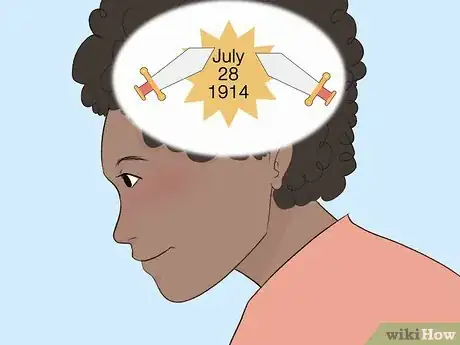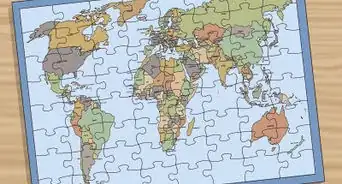This article was co-authored by Josh Jones. Josh Jones is the CEO and Founder of Test Prep Unlimited, a GMAT prep tutoring service. Josh built the world's first and only score guarantee program for private GMAT tutoring. He has presented at the QS World MBA Tour and designed math curricula for Chicago Public Schools. He has over 15 years of private tutoring and classroom teaching experience and a BA in Math from the University of Chicago.
There are 14 references cited in this article, which can be found at the bottom of the page.
wikiHow marks an article as reader-approved once it receives enough positive feedback. This article received 23 testimonials and 94% of readers who voted found it helpful, earning it our reader-approved status.
This article has been viewed 337,372 times.
In order to remember what you read, you need to become a critical, active reader. Become a critical reader by knowing your purpose for reading the material, creating mental pictures of important concepts and ideas, and by asking yourself questions as you read the material. Finally, store the information in your long-term memory bank by discussing the material with others, rewording the material in your own words, and by re-reading important concepts and ideas.
Steps
Setting Yourself Up to Read and Remember
-
1Know what goal you hope to achieve by reading the material. Ask yourself, “Why am I reading this?” or “What am I supposed to learn from reading this?” By understanding your purpose for reading the material, you will be able to stay on task and focus on the more relevant parts of the text.[1]
- For example, if you keep in mind that you are reading the material for an exam, this will help you focus on important dates, events, and people.
-
2Become familiar with the topic. Get to know the topic by doing a quick Internet search. The more you understand and know about a particular topic, the more likely you will be able to make associations and remember the information better.[2]
- For example, if you will be reading about Islam, type in “Islam” in your search engine. Then, click on an article, for example a Wikipedia article, and familiarize yourself with the basic tenets of Islam.
Advertisement -
3Skim the material to pick out the main points. Before reading the material, take note of headings, pictures, tables, blurbs, charts, and opening paragraphs. Focus on the important information that fulfills your purpose for reading the material.[3]
- Skimming the material primes your memory, orients your thinking so you can focus on important information, and helps you formulate a bigger picture of the content, which makes it easier to remember important information.
-
4Read in short segments. Reading when you cannot focus is a waste of time. Therefore, to maximize your focus, read in short segments. For example, read only a section, or read for only 10 to 15 minutes at a time. After you read the section, go over what you just read in your mind.[4]
- Increase your reading endurance by steadily increasing the amount of time you read each day or week. For example, if you read in short segments of 10 to 15 minutes one week, read for 20 to 25-minute segments the next week.
Becoming a Critical Reader
-
1Take notes. As you read, write down relevant information. The tactile act of writing will help you remember the information better. For example, if you are reading about Islam, write down the 5 tenets of Islam.[5]
- You can also underline concepts, or write down ideas that come to your mind as you read.
- This is a form of active reading, which helps you engage with the material instead of just taking it in passively. Active reading will help you absorb and remember the material better.[6]
-
2Highlight important concepts. Try to only highlight important and relevant information. For example, highlight just a few key words on a page. Before you highlight something, ask yourself, “Does this information fulfill my purpose for reading the material?” If the answer is no, then it is best to not highlight it.[7]
-
3Link the material to something you know. Associate new information with information you already know. By associating new information with prior knowledge, your brain will store the new information in your long-term memory bank.[8]
- For example, if Thomas Jefferson was born in the same month as your mom, by linking his birthday to the birthday of someone you know, you will be able to remember the date better.
- It's hard to understand difficult concepts if you don't have a good understanding of the underlying fundamentals. If you're having trouble understanding what you're reading about, it might help to go back to the basics.[9]
-
4Think in pictures. Creating mental pictures for the content you read will help you remember the content better than just reading the content without any mental images. Make mental pictures of important events, concepts, or people. This is an especially helpful strategy for visual learners.[10]
- For example, remember an important date, such as when a battle began, by imagining the battle in your head with the date in big letters.
- You could also try drawing out the battle scene and writing the date of when it began and ended underneath it.
-
5Read out loud. If you are an auditory learner, try reading important material out loud. The act of speaking and hearing the material will enable you to remember the material better. Particularly, read the important information you have underlined, as well as answers to questions out loud.[11]
- You can also use word association to remember important facts. For example, create rhymes or songs to help you remember important information.[12]
-
6Ask yourself questions about the material. While reading the material, ask yourself, “How does this material fit into what I already know and do not know?” “Why did the author mention this?” “Do I understand this concept or word?” “Where is the evidence for this statement?” “What is the main idea of this paragraph?” or, “Do I agree with the author's conclusions?”[13]
- By asking and answering these questions, you will be able to remember relevant information much better.
Reinforcing Your Memory
-
1Reword what you read in your own words. After you finish reading a section, write down what you read in your own words. This will help you assess which information you remember and which information you cannot remember. Go back and re-read the information that you could not remember, or had trouble putting in your own words.[14]
- The goal isn’t to recreate whole passages in your own words. Just write down a quick summary or outline of the main points. Try to stick to a few bullet points or short paragraphs.
-
2Discuss the material with someone. After you read something, discuss the new information with a friend, family member, or classmate. The act of discussing the content will create new associations in your memory. It will also help you see which information you understand and can remember, and which information you do not understand and cannot remember.[15]
- Go back and re-read the information you had trouble relating and remembering. Then, discuss the information with a friend or family member again.
-
3Re-read the material. Repetition is key to remembering any kind of information. After you read something, go back over the important concepts and ideas that you highlighted or underlined. Also, re-read the paragraph in which the concepts and ideas are embedded.[16]
- After 1 or 2 days, go back over the content. Re-read the important concepts and ideas, and quiz yourself.
Expert Q&A
-
QuestionWhat if I'm having trouble understanding what I'm reading?
 Josh JonesJosh Jones is the CEO and Founder of Test Prep Unlimited, a GMAT prep tutoring service. Josh built the world's first and only score guarantee program for private GMAT tutoring. He has presented at the QS World MBA Tour and designed math curricula for Chicago Public Schools. He has over 15 years of private tutoring and classroom teaching experience and a BA in Math from the University of Chicago.
Josh JonesJosh Jones is the CEO and Founder of Test Prep Unlimited, a GMAT prep tutoring service. Josh built the world's first and only score guarantee program for private GMAT tutoring. He has presented at the QS World MBA Tour and designed math curricula for Chicago Public Schools. He has over 15 years of private tutoring and classroom teaching experience and a BA in Math from the University of Chicago.
CEO, Test Prep Unlimited You may need to brush up on your fundamentals. You can't start building a skyscraper at the 5th floor—you have to start at the ground floor and build up from there.
You may need to brush up on your fundamentals. You can't start building a skyscraper at the 5th floor—you have to start at the ground floor and build up from there. -
QuestionIf I start reading late for an exam, what advice can you give me to catch up?
 Community AnswerFocus on the main ideas, things you think will likely be on the test, and material you don't know as well. Skim everything else.
Community AnswerFocus on the main ideas, things you think will likely be on the test, and material you don't know as well. Skim everything else. -
QuestionHow much time should I take for a break while studying?
 Community AnswerFive to 15 minutes per hour is a decent time.
Community AnswerFive to 15 minutes per hour is a decent time.
References
- ↑ https://learningcenter.unc.edu/tips-and-tools/reading-comprehension-tips/
- ↑ https://www.edutopia.org/article/how-metacognition-boosts-learning
- ↑ https://learningcenter.unc.edu/tips-and-tools/skimming/
- ↑ https://www.calcoast.edu/news/top-10-best-tips-help-remember-more-what-you-read
- ↑ https://in.nau.edu/academic-success-centers/sq3r-reading-method/
- ↑ https://mcgraw.princeton.edu/active-reading-strategies
- ↑ https://research.ewu.edu/writers_c_read_study_strategies
- ↑ https://www.helpguide.org/articles/healthy-living/how-to-improve-your-memory.htm
- ↑ Josh Jones. CEO, Test Prep Unlimited. Expert Interview. 15 November 2019.
- ↑ https://www.apa.org/ed/precollege/psn/2013/09/learning-secrets
- ↑ https://www.sciencedaily.com/releases/2017/12/171201090940.htm
- ↑ https://www.educationcorner.com/improving-your-memory.html
- ↑ https://www.student.unsw.edu.au/reading-understanding
- ↑ https://mcgraw.princeton.edu/active-reading-strategies
- ↑ https://www.opencolleges.edu.au/informed/learning-strategies/10-ways-to-retain-more-of-what-you-learn/
- ↑ https://www.apa.org/ed/precollege/psn/2013/09/learning-secrets
About This Article
To remember what you read, start by skimming the material beforehand to help you grasp the bigger picture and purpose of the content. Next, read a section of the text for 10 to 15 minutes. Then, write down what you read in your own words to help you assess what information you remember. If there’s any information you had trouble putting into your own words, go back and re-read that part of the section. Additionally, try discussing the material with a friend to help you memorize and understand the material. For more tips, like how to think in pictures to help you remember what you read, scroll down!











































































